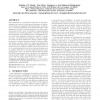Free Online Productivity Tools
i2Speak
i2Symbol
i2OCR
iTex2Img
iWeb2Print
iWeb2Shot
i2Type
iPdf2Split
iPdf2Merge
i2Bopomofo
i2Arabic
i2Style
i2Image
i2PDF
iLatex2Rtf
Sci2ools
111
click to vote
MOBICOM
2006
ACM
2006
ACM
Robust rate adaptation for 802.11 wireless networks
Rate adaptation is a mechanism unspecified by the 802.11 standards, yet critical to the system performance by exploiting the multi-rate capability at the physical layer. In this paper, we conduct a systematic and experimental study on rate adaptation over 802.11 wireless networks. Our main contributions are two-fold. First, we critique five design guidelines adopted by most existing algorithms. Our study reveals that these seemingly correct guidelines can be misleading in practice, thus incur significant performance penalty in certain scenarios. The fundamental challenge is that rate adaptation must accurately estimate the channel condition despite the presence of various dynamics caused by fading, mobility and hidden terminals. Second, we design and implement a new Robust Rate Adaptation Algorithm (RRAA) that addresses the above challenge. RRAA uses short-term loss ratio to opportunistically guide its rate change decisions, and an adaptive RTS filter to prevent collision losses f...
Related Content
| Added | 14 Jun 2010 |
| Updated | 14 Jun 2010 |
| Type | Conference |
| Year | 2006 |
| Where | MOBICOM |
| Authors | Starsky H. Y. Wong, Songwu Lu, Hao Yang, Vaduvur Bharghavan |
Comments (0)

